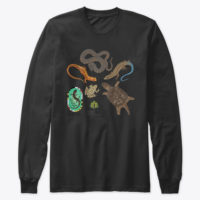Over the last few decades, scientists from multiple disciplines have made great strides in understanding turtle evolutionary history and biology. New fossil discoveries in the field of paleontology have drastically altered our perception of turtle evolutionary origins, and close study of turtle embryonic development has finally begun to reveal how the bizarre body plan of living turtles comes into being.
At this meeting of the NHSM Herp Club, researchers Will Foster and Paul Gensbigler from the Johns Hopkins University School of Medicine will provide an updated overview of modern turtle research, based on their firsthand experience as evolutionary biologists. Their research program at the Center for Functional Anatomy and Evolution aims to unify the fields of paleontology and developmental biology in order to better explain the origins of one of the most charismatic features in Nature: the turtle shell.
This meeting will take place in person at 6908 Belair Rd. Please contact the club coordinator (mfalk@marylandnature.org) if you can’t make it and would like to participate via Zoom.
Are you fascinated by reptiles and amphibians? The Natural History Society of Maryland’s Herp Club promotes the proper husbandry, conservation, study, and appreciation of reptiles and amphibians. Amateurs, professionals, and kids of all ages are welcome. Meetings are held the second Wednesday of every month and are open to the public.
Membership to NHSM is required to join any of our clubs. NHSM membership is $35 for individuals, $50 for families; Herp Club membership is an additional $5 for individuals and $10 for families annually.https://www.marylandnature.org/club-membership/
Learn more about NHSM Clubs: https://youtu.be/pIA7naRjXws


